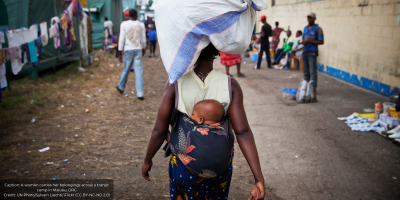The recent outbreak of conflict in Sudan is an escalating and urgent crisis resulting in a breakdown of infrastructures, presenting significant risks to civilians. This article provides a short overview of the situation and healthcare services after the first days of fighting, and specifies the most urgent priorities for support, considering both the long-term effects for the population and the statements by local residents and practitioners of care.
The conflict began with an exchange of fire in the morning of 15 April 2023 in the capital, Khartoum, El-Fasher, Meroë, and then extended to other areas. The war is a result of the struggle of armed forces over resources and power under the current leadership of the Sudan Armed Forces (SAF, led by General Al-Burhan) and the paramilitary Rapid Support Forces (RSF, led by General Mohamed Hamdan Dagalo), originally the so-called Janjaweed militias. This is also a political fight driven by the ambitions of representatives and supporters of the Muslim Brother regime, which was toppled in 2019 following vast public protests, and which tries to regain power in a fight deeply interwoven with regional and international geopolitical interests.
Most of the heavy clashes in this fight take place in densely populated residential areas in Khartoum and other towns. This is where Sudan’s armed forces and paramilitary groups have established their headquarters and many garrisons. Points of central military importance – the presidential palace, the airports, and the bridges – are close to living quarters and sensitive infrastructure, especially hospitals and water stations, and are under constant fire. This includes aerial bombardments in areas with a large number of civilians. Streets are filled with military fighters of both hostile forces, the SAF and the RSF, with a considerable number of roaming individual soldiers and soldier groups who have been separated from their command structures, and have recently started to attack private houses, looking for provisions and harassing inhabitants.
Based on the current situation, I have identified three critical health issues which need addressing:
- Hospitals and other healthcare facilities are part of the essential infrastructure damaged by the fighting, including main hospitals (Khartoum Hospital, Al-Sha’ab Hospital, Ibn Sina Hospital) with large catchment areas and specialisations not available in other facilities inside or outside the capital (e.g. the fistula unit at Khartoum Hospital, cardiology at Al-Sha’ab Hospital, gastroenterology at Ibn Sina Hospital). Other facilities have shortages in fuel and electricity, such as the Jabir Abu Eliz Diabetic Centre where there is a stock of Insulin. Medical personnel and patients have had to hide and flee under fire. Urgent treatment centres, such as a dialysis centre in downtown Khartoum, had to be evacuated and halt operations. Other hospitals, such as the Imperial Hospital and the Police Hospital, were seized by armed forces who forced medical personnel to treat their own soldiers first and who prevented healthcare for soldiers they claimed to be the enemy.
Within this context, immediate action is needed to stop the conflict and restore critical healthcare services. For systems to be restored, attacks on all medical facilities, staff and patients should cease immediately; the Geneva Convention should be respected; and the responsibility of impartial triage of treatment should be restored to medical personnel.
- Local healthcare providers and line ministry officials reported a critical shortage of trauma kits, as well as essential life-saving medicine. Even medical facilities not currently under direct attack lack these essentials due to supply chain disruptions and are constantly in danger of collapsing due to electricity cuts and lack of fuel for emergency generators. Attacks to essential infrastructure, such as water stations, and general insecurity on the streets also causes danger to the water and food supply, putting wide parts of the population under risk of dehydration and hunger. A general call to the population to remain at home, especially for those close to battle zones, has been enforced but also complicates the ability of individuals to meet their daily needs.Efforts have started, however, through residential groups, communal committees, and professional organisations (such as the Central Committee of Sudan’s Doctors, CCSD) to organise provisions under these trying circumstances. They have done this by way of communal collection of food and non-food items, and through public and social media information on alternative service provision in residential areas, for instance by local care practitioners. Both telephone and internet connections have been used to that end, in addition to advice on psycho-social support, especially for children. Responses from some organisations active in the country have been forthcoming but slow, mostly due to the general insecurity and procedural limits.
All possible efforts should be made to establish and support logistic pathways for those provisions, especially trauma kits, life-saving medicine, and emergency food items. Bureaucratic obstacles to such efforts should be suspended as much as possible, especially by making use of communal and professional experiences with fast emergency responses under critical conditions of physical and infrastructural strain.
- Fighting on the streets has been conducted without regard to the establishment of safe humanitarian corridors to transport the injured and the dead. No official numbers of killed soldiers have been released, but many streets, squares, and buildings in the battle zones of Khartoum are strewn with bodies. Several reports have come in of civilians being buried on the spot, without their families being present and without the required rituals. According to a report of the Central Committee of Sudan’s Doctors, there have been 144 civilians confirmed killed and 1409 injured up to 17 April 2023, with estimated numbers being much higher and registered cases constantly rising. Both national and international voices have called for the establishment of humanitarian corridors and ceasefires. In spite of official declarations by both sides to be willing to implement these corridors, fighting has continued unabated.
The establishment of humanitarian corridors is fundamentally importance and an essential element of warfare according to international law and conventions, to which both sides in Sudan have previously committed. The environmental health impact of corpses rotting in open spaces should be another urgent concern to be addressed with the hostile forces, apart from their digression from generally accepted socio-cultural rules in the treatment of dead bodies.
The situation in Sudan is critical, and the conflict is causing major interferences with the health and other infrastructures, which are putting even more lives at risk. Any support extended to the people of Sudan in these respects will be highly appreciated, whether directly or indirectly by showing solidarity and by informing about the current situation in the country.
Mariam is a SSHAP fellow who is currently a doctoral researcher based at the Ecole des hautes études en science sociales (EHESS).




